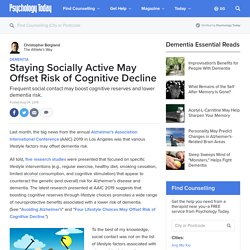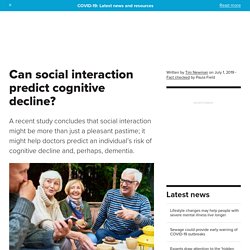

Staying Socially Active May Offset Risk of Cognitive Decline. Last month, the big news from the annual Alzheimer's Association International Conference (AAIC) 2019 in Los Angeles was that various lifestyle factors may offset dementia risk.

All told, five research studies were presented that focused on specific lifestyle interventions (e.g., regular exercise, healthy diet, smoking cessation, limited alcohol consumption, and cognitive stimulation) that appear to counteract the genetic (and overall) risk for Alzheimer's disease and dementia.
The latest research presented at AAIC 2019 suggests that boosting cognitive reserves through lifestyle choices promotes a wide range of neuroprotective benefits associated with a lower risk of dementia. (See "Avoiding Alzheimer's" and "Four Lifestyle Choices May Offset Risk of Cognitive Decline. ") article continues after advertisement. Higher levels of social activity decrease the risk of cognitive decline.
If you want to keep your brain healthy, it turns out that visiting friends, attending parties, and even going to church might be just as good for you as crossword puzzles.

According to research conducted at Rush University Medical Center, frequent social activity may help to prevent or delay cognitive decline in old age. The study has just been posted online in the Journal of the International Neuropsychological Society. The researchers were especially careful in their analysis to try to rule out the possibility that cognitive decline precedes, or causes, social isolation, and not the reverse. "It's logical to think that when someone's cognitive abilities break down, they are less likely to go out and meet friends, enjoy a camping trip, or participate in community clubs. If memory and thinking capabilities fail, socializing becomes difficult," said lead researcher Bryan James, PhD, postdoctoral fellow in the epidemiology of aging and dementia in the Rush Alzheimer's Disease Center. Can social interaction predict cognitive decline? A recent study concludes that social interaction might be more than just a pleasant pastime; it might help doctors predict an individual’s risk of cognitive decline and, perhaps, dementia.

Cognitive decline refers to a general reduction in mental abilities over time. It affects many people as they age and, in some cases, can lead to dementia. As the average age of the population rises, an increasing number of people are likely to experience cognitive decline. A group of researchers from Brigham and Women’s Hospital in Boston, MA, are interested in the potential role that social interaction might play. Specifically, their most recent study looked at whether there is an interaction between levels of social activity, cognitive performance, and the amount of beta-amyloid in the brain, which is a neurological hallmark of Alzheimer’s disease.
To investigate, the scientists followed 217 older adults involved in the Harvard Aging Brain Study. Ageing Socially and Gracefully. For older adults, staying connected with friends and family and engaging fully in life through social activities are key to successful ageing.

Healthy Ageing is Ageing Gracefully Ageing is a journey that is better shared, and sharing the golden moments with the people around you is priceless. From reminiscing about the good old times to catching up on the years in-between, there are parts of one’s life that family and friends can relate. Carving time out to socialise is important for one’s mental wellbeing, at any age. So instead of staying at home, why not make it a goal to stay connected with old friends or get to know new ones more regularly?
Social Benefits of Staying Connected Isolation and loneliness are known risk factors for poor physical and mental wellbeing. Depression or dementia at bay. Studies have shown that extroverts are less likely to catch a cold as social engagement is linked to a stronger immune system, especially for older adults[1]. Lower risk of dementia Troyer, A. Staying Social While Aging In Place: 7 Ideas for Active Seniors - Companions For Seniors. For the elderly, aging in place can be convenient, affordable, and flexible.

According to research from the AARP, the vast majority of seniors say that they would prefer to stay at home for as long as possible as they grow older. Receiving long-term care in the comfort and safety of home is a great way for seniors to maintain their independence, keep up their health, and continue to live life to the fullest, while living in an environment that is familiar and full of warm, nourishing memories. At the same time, aging in place is also a powerful way for seniors to connect with their community and nurture meaningful relationships, making life vibrant and fun for years to come!
How Can Seniors Remain Social While Aging in Place? Remember: for older adults, aging in place does not have to mean being alone! Maintaining and building these relationships over time is incredibly important. 1.) Living at home gives seniors the opportunity to host friends or family in their own space. 2.) 3.) 4.)